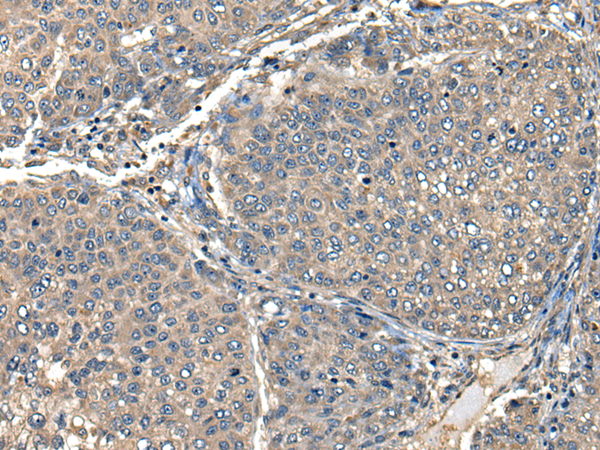
| WB | 咨询技术 | Human,Mouse,Rat |
| IF | 咨询技术 | Human,Mouse,Rat |
| IHC | 1/30-1/150 | Human,Mouse,Rat |
| ICC | 技术咨询 | Human,Mouse,Rat |
| FCM | 咨询技术 | Human,Mouse,Rat |
| Elisa | 1/5000-1/10000 | Human,Mouse,Rat |
| Aliases | CD64; FCRI; CD64A; IGFR1 |
| Host/Isotype | Rabbit IgG |
| Antibody Type | Primary antibody |
| Storage | Store at 4°C short term. Aliquot and store at -20°C long term. Avoid freeze/thaw cycles. |
| Species Reactivity | Human |
| Immunogen | Synthetic peptide of human FCGR1A |
| Formulation | Purified antibody in PBS with 0.05% sodium azide and 50% glycerol. |
+ +
以下是关于FCGR1A抗体的3篇参考文献及其摘要概述:
---
1. **文献名称**:*"Fcγ receptor I (CD64) expression and function on human dendritic cells"*
**作者**:van der Poel, C.E. et al.
**摘要**:该研究探讨了FCGR1A(CD64)在人类树突状细胞中的表达及功能。作者发现,FCGR1A通过介导高亲和力IgG抗体结合,显著增强树突状细胞的抗原提呈能力,进而促进T细胞激活,为抗体依赖性免疫治疗提供了机制支持。
---
2. **文献名称**:*"Targeting CD64 mediates elimination of tumor-associated macrophages"*
**作者**:Dahiya, S. et al.
**摘要**:研究开发了一种靶向FCGR1A(CD64)的单克隆抗体,通过特异性结合肿瘤相关巨噬细胞(TAMs)表面的FCGR1A,诱导其凋亡并重塑肿瘤微环境,从而增强化疗药物在实体瘤中的疗效。
---
3. **文献名称**:*"Anti-CD64 antibody conjugated nanoparticles for targeted phagocytosis suppression in autoimmune diseases"*
**作者**:Li, X. et al.
**摘要**:该文献提出了一种基于FCGR1A抗体的纳米颗粒递送系统,用于抑制自身免疫性疾病中过度活跃的巨噬细胞吞噬作用。实验表明,该策略可有效减少炎症反应,并在小鼠模型中缓解类风湿性关节炎症状。
---
4. **文献名称**:*"Structural basis of FcγRIA recognition by therapeutic antibodies"*
**作者**:Bruhns, P. et al.
**摘要**:通过X射线晶体学解析了FCGR1A与不同治疗性抗体的复合物结构,揭示了抗体结合表位的关键氨基酸残基,为设计高特异性FCGR1A靶向药物提供了结构生物学依据。
---
以上文献涵盖了FCGR1A抗体在免疫调节、肿瘤治疗、自身免疫疾病及结构机制中的研究进展。
**Background of FCGR1A Antibodies**
FCGR1A (Fc gamma receptor Ia), also known as CD64. is a high-affinity receptor for the Fc region of immunoglobulin G (IgG). It belongs to the Fcγ receptor family and is primarily expressed on immune cells such as monocytes, macrophages, dendritic cells, and neutrophils. Structurally, it comprises an extracellular IgG-binding domain, a transmembrane region, and a cytoplasmic tail with immunoreceptor tyrosine-based activation motifs (ITAMs). Unlike low-affinity Fcγ receptors, FCGR1A binds monomeric IgG with high efficiency, enabling its critical role in immune complex recognition and effector functions.
FCGR1A mediates phagocytosis, antibody-dependent cellular cytotoxicity (ADCC), and pro-inflammatory cytokine release, linking adaptive and innate immunity. Its activation triggers intracellular signaling pathways that enhance antigen presentation and pathogen clearance. Dysregulation of FCGR1A is implicated in autoimmune diseases (e.g., rheumatoid arthritis) and infections, making it a focus for therapeutic targeting.
FCGR1A-specific antibodies are pivotal in research and clinical applications. Monoclonal antibodies (e.g., anti-CD64) are used to study receptor-ligand interactions, immune cell activation, and inflammatory pathways. Therapeutically, they are explored to modulate immune responses—blocking FCGR1A to suppress inflammation or engineering bispecific antibodies to direct cytotoxic activity against cancer cells. Additionally, FCGR1A-targeting therapies aim to enhance the efficacy of antibody-based treatments by optimizing Fc receptor engagement, highlighting its potential in precision medicine.
×